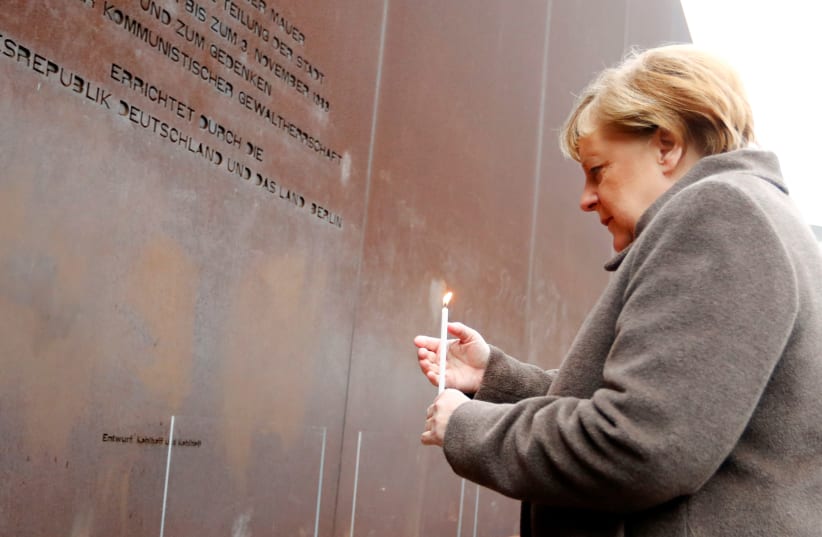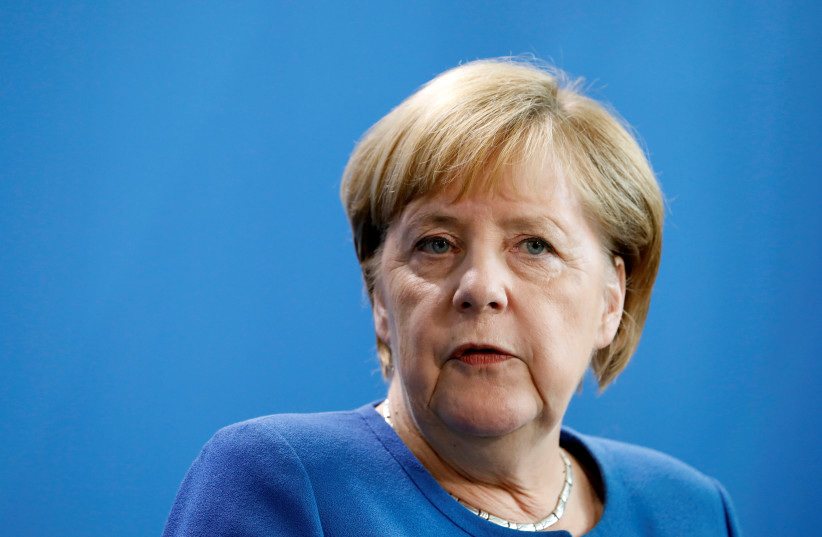The assistant professorship that is any doctoral student’s wish was one nod away from her when the future Angela Merkel (Kasner, at the time) was asked to double as an informant for the Stasi, East Germany’s secret police.
The 24-year-old physicist, whose disdain for melodrama would later become legend, said no, but instead of adding a provocative statement just said: “I can’t keep secrets.”
It was 1978 and the Stasi’s spooks could not imagine the real secret, that they were facing a united Germany’s future matriarch and a post-communist Europe’s undeclared queen.
Now, as her 16-year chancellorship draws to a close, Merkel is set to be remembered as a vestige of an era of optimism that was as brave and inspiring as it was brief and naïve.
IRONICALLY, the East German revolution’s poster girl was no revolutionary.
Yes, she told the Stasi no that day, but she joined no underground, made no active protest and never claimed to have braved Soviet repression the way Lech Walesa, Vaclav Havel, Natan Sharansky, Aleksandr Solzhenitsyn or Andrei Sakharov did.
Merkel was no rebel. Boring and uncharismatic, the East German lawmaker who became West German leader Helmut Kohl’s briefcase holder was no firebrand or orator. She swept no audience off its feet and was no trigger-happy warrior, in any sense and on any front. She was no Margaret Thatcher.
She was also no exhibitionist. Merkel was no Willy Brandt, who fell on his knees in front of the Warsaw Ghetto Memorial, and she was no Ronald Reagan, who located his loud cry “Mr. Gorbachev, tear down this wall” at the foothills of the monstrosity that Merkel knew all too well.
Merkel was also no originator of ideas.
Unlike Otto von Bismarck, who created the modern social safety net; unlike Konrad Adenauer, who led the rise of New Germany and the emergence of the European Community and unlike Helmut Kohl, who spearheaded Germany’s reunification, Merkel created little, focusing instead on the preservation of other people’s legacies.
Yes, she was a great crisis manager. Faced with the Greek economic crisis, Merkel produced a deal that balanced economic prudence with European solidarity.
The result, enormous pain for the Greeks and a loss of billions for its creditors, was no idyll, but it kept the union alive, left its cracking currency intact, and consolidated Germany’s position as Europe’s center of gravity. At the same time, faced with the 2008 meltdown’s shock she led the German economy to quick recovery at a minimal cost.
Meanwhile, faced with a newly assertive Russia’s invasions of Georgia and Ukraine, Merkel led with the US a vast international effort to sanction Moscow while keeping intact Nord Stream 2, a mega-project aimed at feeding Europe with Russian gas.
However, crisis management is one thing and shaping history is another.
IT WILL take decades to gauge her historic imprint, but right now it seems that the future’s growing pressures were too heavy for Merkel’s stubborn efforts to preserve the past.
At home, the political center steadily eroded under Merkel’s watch.
The two major parties, which in the last election before her chancellorship won a combined 76% of the vote, shrank during her tenure to a combined 49.8%. The growth of radical parties was underscored by the emergence of the far-right Alternative for Germany, which did not exist before Merkel’s arrival and has since come to grip a solid one-tenth of the electorate.
Abroad, the European Union, which under her predecessors gradually grew from six members to 28 shrank for the first time in its history, following Britain’ departure. Meanwhile, the euro that she inherited from her predecessors was exposed during her chancellorship as a vulnerable currency of a disjointed polity.
Merkel’s titanic effort to keep the EU and its currency intact was challenged not only by the imbalances between its richer north and poorer south, but also by the deepening chasm between its liberal West and conservative East.
The common denominator between these setbacks is not that they happened because of Merkel’s mistakes, but that they happened despite her resistance.
Now, chances that the trends she defied will accelerate are higher than the chances that they will be offset. In fact, chances are Merkel will eventually loom not only as no Reagan, Adenauer or De Gaulle, but as a version of Franz Josef, the Hapsburg monarch whose 68-year reign of prosperity and seeming stability actually concealed a decaying empire’s approaching demise.
Like the Austro-Hungarian Empire in its twilight, Merkel’s European Union may have grown too big, too varied, and too loose to last; an optimistic era’s utopia predestined to make way for the cynicism that was its aftermath.
It was between these two poles, the optimism that animated her political emergence and the pessimism that overshadows her departure, that Merkel made her career’s one big move, when she opened her country’s doors to more than a million Muslim refugees.
YES, it was a gamble that fueled xenophobia, sparked violence, and might ultimately prove to have accelerated the European Union’s disintegration. And never mind that less than a decade since their arrival half of the new immigrants are already gainfully employed and paying taxes.
Even if this experiment proves to have been a social failure and a political disaster, morally speaking it was an act of humanity, generosity, humility, and nobility that no one before Merkel, from Thatcher and Reagan to Adenauer and Brandt, ever did; a gamble worthy of the unassuming scientist whose life at the free world’s summit never made her forget her origins in dictatorship’s despair.
That is why Angela Merkel deserves the Nobel Peace Prize more than all the leaders whose political gravitas she didn’t possess, whose intellectual originality she didn’t display, and whose historic imprint she didn’t etch.
The writer’s bestselling Mitzad Ha’ivelet Ha’yehudi (The Jewish March of Folly, Yediot Sefarim, 2019), is a revisionist history of the Jewish people’s leadership from antiquity to modernity.

